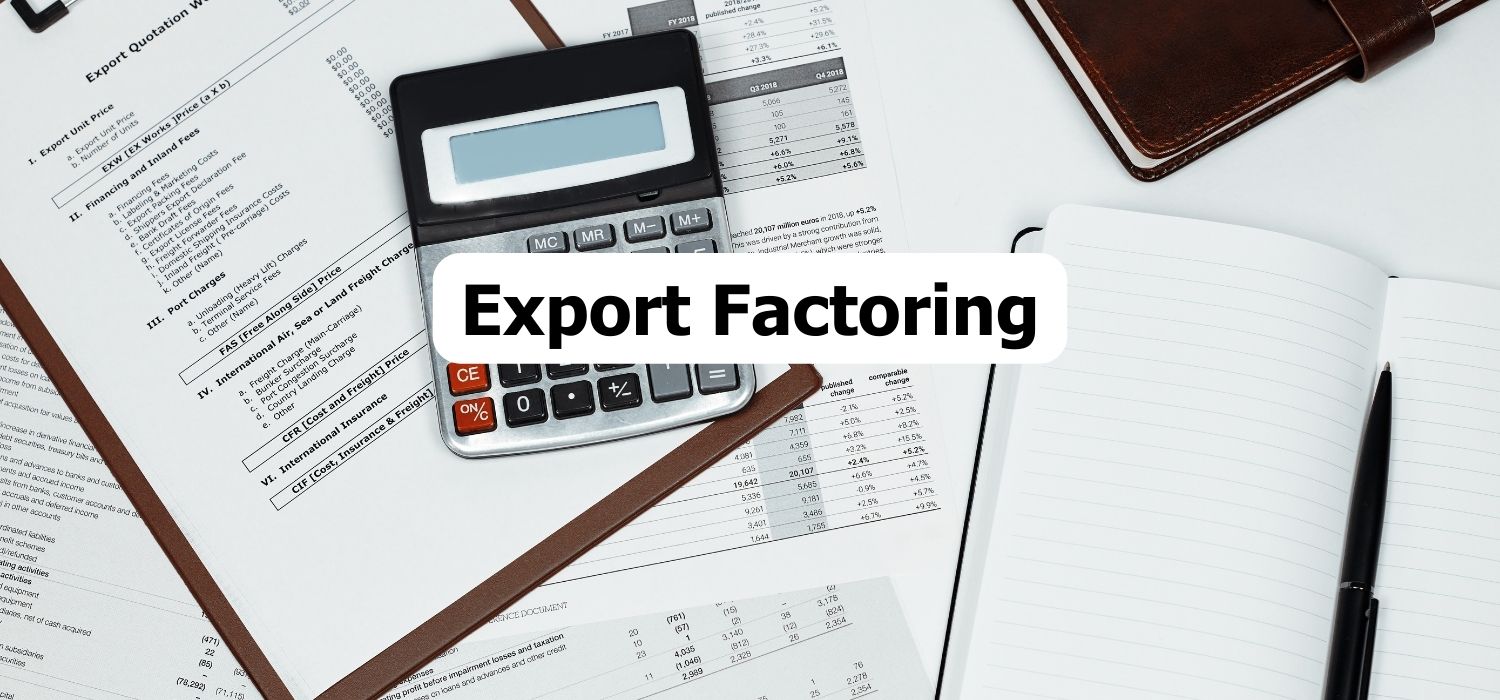Introduction In India, the majority of income comes from the agricultural sector. The nation ranks among the top producers of food items and agricultural goods worldwide. The growth rate of India’s agriculture sector predicted to be 3.5% in 2022–2023 and 3.0% in 2021–2022. In agriculture and related industries, the gross value added (GVA) increased by […]
What is Export Factoring? How Can it Help with Financing Needs?
3 Jan, 2024

Businesses engaged in international trade frequently encounter issues with cash flow and liquidity due to extended settlement times for invoices from importers to exporters.
This is where Export factoring comes in
In this blog we will talk about what is export factoring, how export financing works, types of export factoring, export financing advantages and so on.
What is Export Factoring?
Export factoring is the process where a factor (lender) purchases a company receivables or invoices at discount for immediate cash. The factor is third party financial institutions like NBFCs.
Export factoring includes services like foreign account receivables bookkeeping, export working capital financing, credit insurance and collection services. It paves the way to provide easy finance to exporters.
Export factoring is very different from traditional financing. In traditional financing, businesses borrow a set amount from a financial institution and repay it over time with interest. On the other hand, with export factoring, businesses sell their accounts receivable to a factor, converting unpaid invoices into instant cash.
How Does Export Factoring Work?
The following steps explains the working of export factoring:
Step1:
Exporters sell goods to the importer. In return, the importer issues invoice/receivables.
Step 2:
Exporter sells receivables/invoice that they get from the importer to the third-party called the export factor
Step 3:
The exporter receives a certain percentage of the amount from the export factor.
Step 4:
When the maturity period ends, the export factor receives the rest of the amount from the importer.
Advantages of Export Factoring
With time, exporters are becoming comfortable because of the benefits it offers. Here are the 5 advantages of export factoring:
1. Receive money in quick time
When an exporter sells receivables to the factor, he/she receives the money immediately ( a % of amount). This money fulfills the immediate cash requirements and allows the business to run smoothly.
2. Reduces credit burden and risk:
Export factoring reduces the wait for customer payments and lessens dependence on credit lines or loans.
Factoring companies often assume the credit risk associated with international transactions. They assess the creditworthiness of the foreign buyers, reducing the exporter’s exposure to non-payment or default. This minimizes the risk of bad debts, freeing the exporter from managing credit risks and potential losses.
3. No collection hassles:
The factoring company handles collections, freeing up the exporter’s time and resources. This avoids the complexities of dealing with international collections, language barriers, and different legal systems.
4. Improved Working Capital Management:
With a steady cash flow, businesses can better manage their working capital. They can negotiate better terms with suppliers, take advantage of early payment discounts, and maintain sufficient liquidity for day-to-day operations.
5. Access to Expertise:
Factoring companies often offer additional services like credit analysis, risk assessment, and market intelligence. This insight into global markets can assist exporters in making informed decisions, entering new markets, or adjusting strategies based on changing economic conditions.
Types of Export Factoring
There are commonly 2 types of export factoring:
1. Recourse Factoring: In recourse factoring, the exporter remains responsible for any unpaid invoices if the buyer fails to pay. If the buyer defaults, the exporter needs to buy back the invoices or repay the advanced funds to the factoring company.
2. Non-Recourse Factoring: Non-recourse factoring shifts the risk of non-payment to the factoring company. If the foreign buyer defaults due to insolvency or credit issues, the factoring company absorbs the loss, not the exporter.
These types can further vary based on specific terms and conditions offered by individual factoring companies, including additional services like credit protection, collections management, and financing options tailored to exporters’ needs.
Current Demand for Export Factoring in India
Export contributes 21.4% to India’s GDP. In 2022, 130 of the 31 export sectors monitored by the Indian Ministry of Commerce saw positive growth.
India is experiencing a notable uptick in export factoring. As exports continue to grow, the industry is becoming more competitive. To keep up with this competition, businesses need enough working money to run smoothly. That’s why businesses now are turning to export factoring more often.
Also, advancements in technology have simplified access to export factoring services for businesses, while also enabling factoring companies to deliver their services more efficiently.
However, the export factoring in India is growing at a very slow pace as compared to other nations. The major reasons for this slow pace are higher interest rate, lack of awareness in the export market.
Conditions to Obtain Export Factoring in India
The conditions to obtain export factoring in India can vary among different financial institutions or factoring companies. However, some common conditions might include:
Business Legitimacy: Typically, the business seeking export factoring needs to be a legitimate entity with a track record of exporting goods or services.
Creditworthiness: The exporter’s buyers (foreign customers) may be assessed for creditworthiness by the factoring company. This evaluation can impact the terms and rates offered for factoring.
Volume of Sales: Factoring companies may have minimum requirements regarding the volume or value of export sales to qualify for their services.
Quality of Invoices: The invoices presented for factoring should meet certain standards, including being valid, non-disputed, and payable within an acceptable timeframe.
Agreement Terms: The specific terms and conditions of the factoring agreement, including fees, contract duration, and recourse or non-recourse arrangements, will be outlined and agreed upon between the exporter and the factoring company.
Documentation: The exporter might need to provide documentation related to the export transactions, such as invoices, shipping documents, contracts, and other relevant paperwork.
Due Diligence: Factoring companies might conduct due diligence on the exporting business to ensure compliance with regulations and to assess the overall financial health and reliability of the company.
It’s advisable for businesses interested in export factoring to consult with factoring companies or financial institutions directly to understand their specific eligibility criteria and the terms offered for their services.
Conclusion
Export factoring is a comprehensive solution that extends beyond simply enhancing cash flow. It only fosters growth and operational flexibility but also strengthens businesses against uncertainties, enabling them to thrive in the global market with more confidence and stability.



